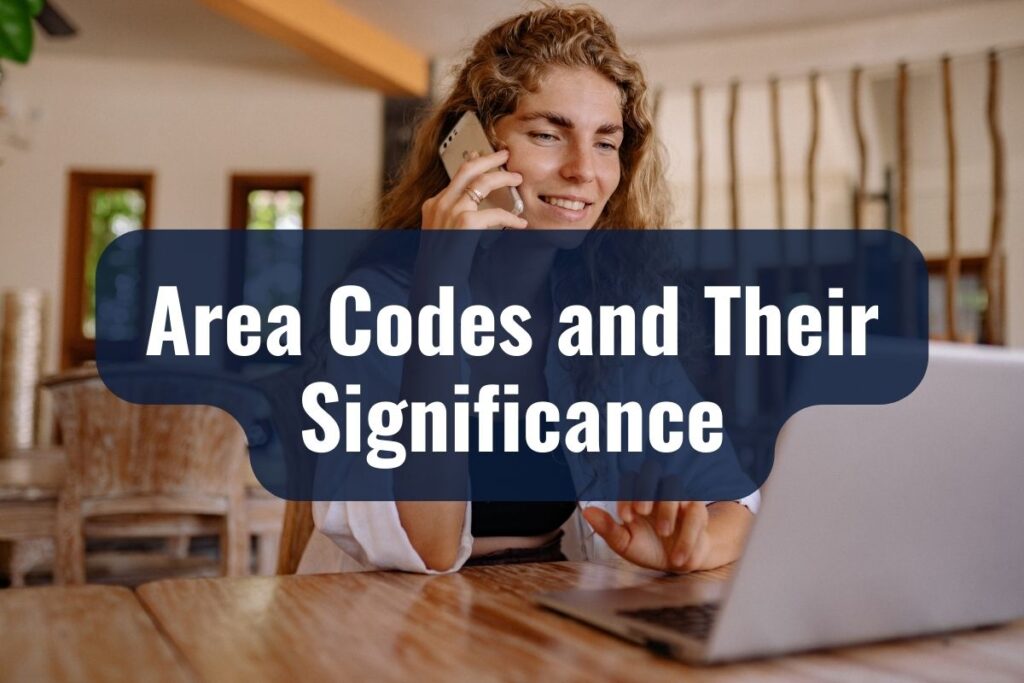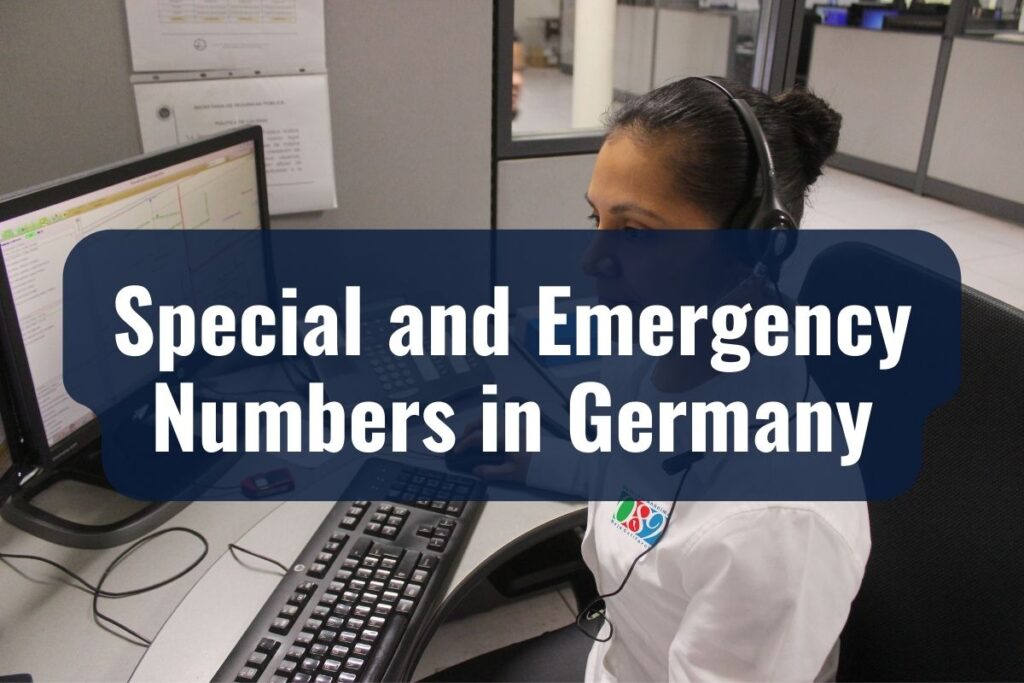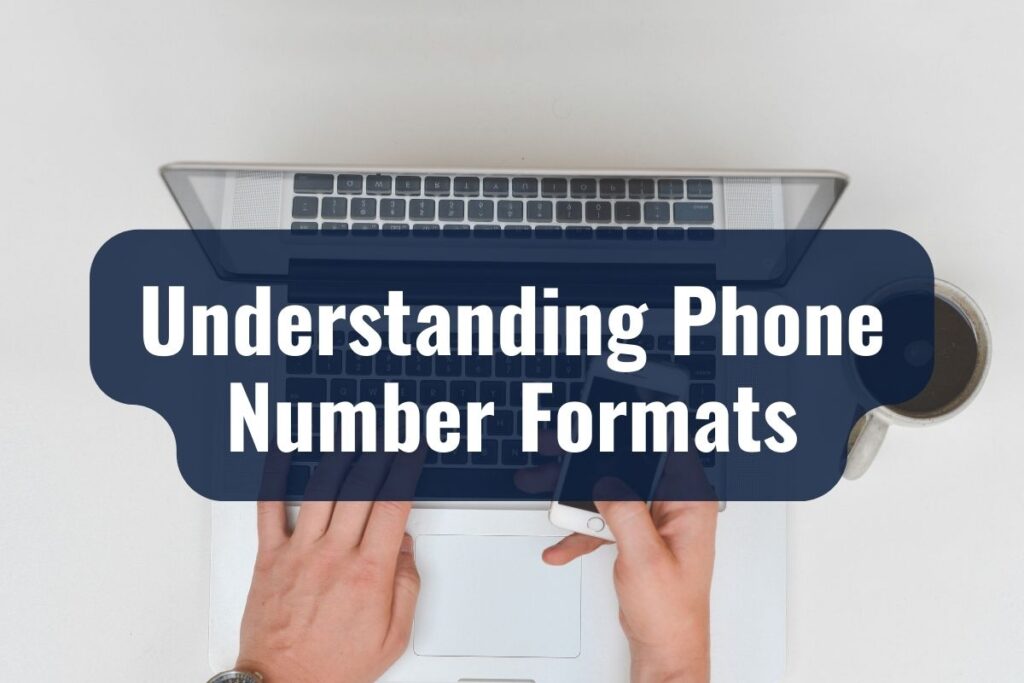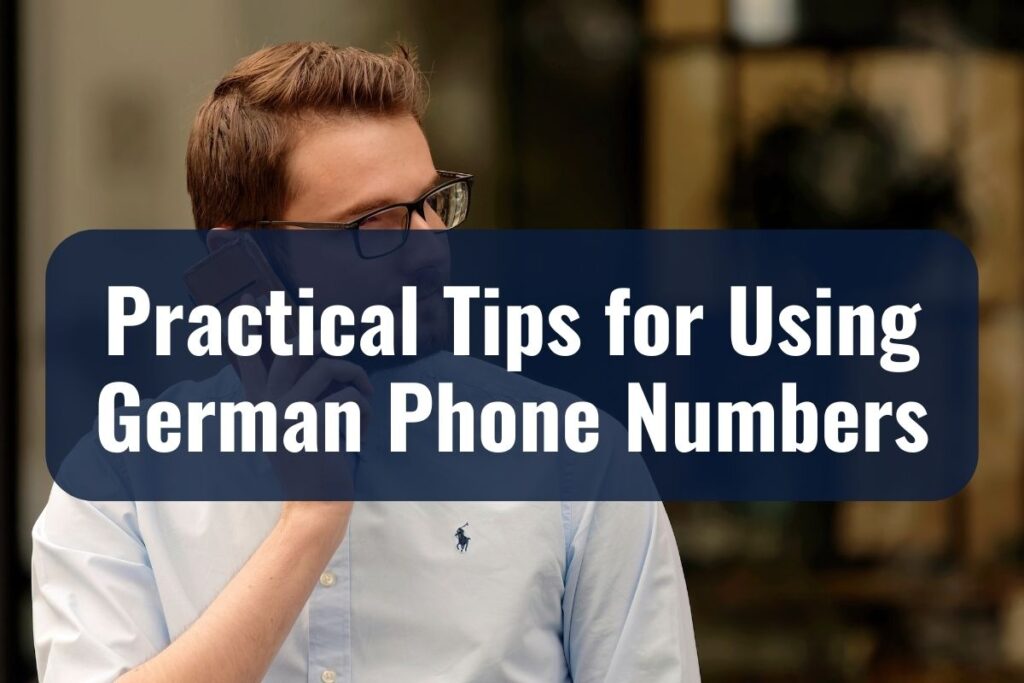Whether you’re a new resident, a business owner, or someone who regularly interacts with telecommunications in Germany, understanding the intricacies of the German phone number system is essential.
This guide aims to demystify the structure and dialing codes of German phone numbers, providing you with practical knowledge to communicate effectively in Germany.
Key Takeaways
- Landline vs. Mobile: Landlines are geographically specific, while mobile numbers start with non-geographic prefixes like 015, 016, or 017.
- Major Area Codes: Major cities in Germany have specific area codes, e.g., Berlin (030), Munich (089).
- Mobile Network Operators: Major operators include Deutsche Telekom, Vodafone, and O2, each with distinct prefixes.
- Emergency Numbers: Key emergency services are reachable at 112 (general) and 110 (police).
- Special Numbers: Services like toll-free (0800) and premium rate (0900, 0180) have unique prefixes.
- International Dialing: Use 00 + country code + area code + number for international calls from Germany.
Understanding the German Phone Number System
The German phone number system is characterized by its precision and structure, reflecting the country’s organized approach to telecommunications. Here, we’ll break down the basics of this system, helping you understand how German phone numbers are formed and what each part of a number signifies.
General Structure of German Phone Numbers
German phone numbers consist of an area code (known as a ‘Vorwahl’) and a subscriber number (‘Rufnummer’). The total length of a phone number varies, typically falling between 10 and 11 digits, including the area code. This length can be shorter for older numbers, especially in rural areas.
Area Code (Vorwahl)
This part of the number identifies the geographic region of the phone line. Area codes in Germany can be as short as two digits for major cities like Berlin (030) or as long as five digits for smaller towns and rural areas.
Subscriber Number (Rufnummer)
Following the area code, this is the unique number assigned to each phone line. Its length varies depending on the area code’s length, ensuring that the total digit count remains consistent.
Landline vs. Mobile Numbers
Understanding the distinction between landline and mobile numbers in Germany is crucial for effective communication.
Landline Numbers: These numbers are geographically bound and start with a specific area code. For instance, a number in Munich will start with 089, immediately signaling the caller that the number is based in Munich.
Mobile Numbers: Unlike landline numbers, mobile numbers are not tied to specific geographic areas. They typically begin with a prefix like 015, 016, or 017, followed by a unique set of numbers. Mobile numbers in Germany do not have a distinct area code, but the initial digits (015, 016, 017) are a clear indicator of a mobile number.
Area Codes and Their Significance

In Germany, area codes play a crucial role in the telephone numbering system. They are more than just a series of digits; they are indicators of geographical areas, essential for routing calls to their correct destinations. Understanding these codes is key to grasping the broader context of German telecommunications.
The Role of Area Codes in Dialing
Geographic Indicators: Each area code is associated with a specific region or city. For instance, Berlin is represented by the area code 030, while Munich uses 089. This means that any number starting with these codes is located in these cities or their immediate surroundings.
Importance in Local and Long-Distance Calling: When making a call within the same city or area, dialing the area code is not always necessary. However, for long-distance calls, including the area code is a must. This signals the telephone network to route the call to the correct geographic region.
Major Area Codes for Key Cities in Germany
Here’s a list of some of the major area codes for key cities in Germany, which can be particularly helpful for those new to the country:
| City | Area Code |
| Berlin | 030 |
| Munich (München) | 089 |
| Frankfurt | 069 |
| Hamburg | 040 |
| Cologne (Köln) | 0221 |
| Stuttgart | 0711 |
| Düsseldorf | 0211 |
| Dortmund | 0231 |
| Essen | 0201 |
| Leipzig | 0341 |
These codes are just a few examples of how diverse the area code system is in Germany, with each region having its unique identifier.
Dialing with Area Codes
From a German Landline to German Landline: If calling from the same area, the area code can often be omitted. For instance, a call within Munich would not require dialing 089.
From a German Landline to German Mobile: Always include the mobile prefix (e.g., 015, 016, 017) regardless of the location.
From a Mobile Phone: Always dial the full number, including the area code, regardless of your location.
Mobile Phone Numbers in Germany
Mobile phone numbers in Germany are distinct from landline numbers, characterized by specific prefixes and a degree of uniformity across the country. As mobile phones have become ubiquitous, understanding their numbering system is vital for anyone living in or doing business with people in Germany.
Structure of German Mobile Phone Numbers
German mobile phone numbers typically begin with a four-digit prefix, which is not geographically specific, unlike landline area codes. These prefixes indicate that the number is a mobile number and can give a clue about the mobile network operator. The general structure is as follows:
Prefix
This is usually a four-digit number starting with 015, 016, or 017. Each mobile network operator in Germany has specific prefixes assigned to it. For example, numbers starting with 0151, 0160, or 0170 are usually associated with the Deutsche Telekom network.
Unique Number
Following the prefix is the unique number assigned to an individual’s mobile phone. This part of the number varies in length but, together with the prefix, typically results in a total of 10 to 11 digits.
Major Mobile Network Operators in Germany
Germany’s mobile network landscape is dominated by a few major operators, each with its range of prefixes. Here are some of the key players:
Deutsche Telekom: Known for its extensive coverage and high-quality service, Telekom uses prefixes like 0151, 0160, and 0170.
Vodafone: Another major operator with a strong network, Vodafone’s numbers often start with 0152, 0162, or 0172.
O2 (Telefónica Germany): O2 numbers typically start with prefixes like 0159, 0176, or 0179.
Understanding these operators and their associated prefixes can be helpful when choosing a mobile service provider or identifying the network of your contacts in Germany.
Portability and Prefixes
It’s important to note that due to number portability in Germany, users can retain their phone numbers when switching providers. This means that the prefix may not always accurately indicate the current operator of a mobile number.
Special and Emergency Numbers in Germany

Germany, like many other countries, has designated special and emergency numbers for quick access to various services. These numbers are crucial for ensuring safety and accessibility to essential services for both residents and foreigners. Understanding these numbers can be a lifesaver in urgent situations and also helps in accessing special services.
Emergency Numbers
General Emergency Services (112): This is the pan-European emergency number, which also applies in Germany. Dialing 112 connects you to emergency services like the fire brigade and ambulance. This number can be dialed from any phone, free of charge, even without a SIM card.
Police (110): For police services, the number to dial is 110. This connects you directly to the local police station for immediate assistance in case of crimes or security threats.
These emergency numbers are operated around the clock and are essential for immediate assistance in urgent situations.
Special Service Numbers
Germany also has a range of special service numbers, typically used for non-emergency but important services:
Toll-Free Numbers (0800): These numbers are free to call from within Germany. They are often used for customer service lines, helplines, and information services.
Premium Rate Numbers (0900, 0180): These numbers are used for various services like technical support, consultancy, or entertainment. Calls to these numbers are charged at higher rates.
Directory Assistance (118xx): For directory inquiries, several numbers start with 118. These services can help you find phone numbers and addresses but are usually chargeable.
Non-Emergency Medical Services (116 117): For non-emergency medical assistance, such as out-of-hours doctors or medical advice, you can call this number.
Importance of Special and Emergency Numbers
Knowing these numbers is not only critical for dealing with emergencies but also for navigating daily life in Germany more effectively. They provide a direct line to vital services, from health and safety to customer support and information. In emergencies, understanding these numbers and their purposes can be lifesaving.
International Dialing: Calling To and From Germany
Navigating international dialing is a key aspect of telecommunications, especially for new residents in Germany and businesses with global connections. Understanding how to dial international numbers from Germany correctly and how to call German numbers from abroad is essential for effective and hassle-free communication.
Calling German Numbers from Abroad
When you need to call a German phone number from outside Germany, there are specific steps to follow:
International Access Code: Start with the international access code from your country. For most countries, this is 00 or 011 (in the case of the United States and Canada).
Country Code for Germany: After the international access code, dial 49, which is the country code for Germany.
Area Code and Phone Number: Next, dial the German area code (without the leading zero) and the rest of the phone number. For example, for a Berlin number, you would dial 30 (not 030) followed by the subscriber’s number.
Example: Calling a Berlin number from the USA would be 011 (international access code) + 49 (Germany’s country code) + 30 (Berlin’s area code without the zero) + subscriber’s number.
Dialing International Numbers from Germany
To make an international call from Germany, the process is slightly different:
International Access Code from Germany: Start with 00, which is the international access code from Germany.
Country Code of the Destination Country: Dial the country code of the destination country. For example, 44 for the United Kingdom or 1 for the United States.
Area Code and Phone Number: Finally, dial the area code (if applicable) and the phone number in the destination country.
Example: Calling a New York number from Germany would be 00 (international access code from Germany) + 1 (USA’s country code) + 212 (New York’s area code) + subscriber’s number.
Tips for International Dialing
Drop Leading Zeros: When dialing internationally, always omit the leading zero in the area code.
Check International Call Rates: International calls can be expensive. It’s advisable to check with your service provider for rates or consider alternatives like VoIP services.
Time Zone Differences: Be mindful of time zone differences to avoid calling at inconvenient hours.
Understanding Phone Number Formats

Grasping the standard format of German phone numbers and recognizing their variations is important for anyone navigating the German telecommunications system. This understanding not only aids in accurate dialing but also in recognizing and recording phone numbers correctly.
Standard Formatting of German Phone Numbers
German phone numbers follow a relatively standard format, which can vary slightly depending on whether the number is a landline or mobile and also on personal or business preferences.
Landline Numbers: Typically, landline numbers are written in the format of an area code followed by the subscriber number. The area code is usually enclosed in parentheses, and a space or dash is used to separate it from the subscriber number. For example, a number in Berlin might be written as (030) 12345678.
Mobile Numbers: Mobile numbers, on the other hand, often follow a block format for ease of reading. For instance, a mobile number might be written as 0171 234 5678. The first four digits represent the network prefix, followed by two blocks of numbers.
Variations in Formatting
The formatting of phone numbers in Germany can vary based on personal or business preferences. Some people or businesses might write numbers without spaces, while others may group the digits in different ways. Here are some common variations:
- Continuous string: 03012345678 or 01712345678
- Different block groupings: 030 12 34 56 78 or 0171 23 45 678
These variations, while seemingly minor, can impact readability, especially for those not familiar with the German phone number system.
Why Formatting Matters
Proper formatting of phone numbers is not just about aesthetics; it plays a practical role too:
Ease of Reading: Correctly formatted numbers are easier to read and understand, reducing the chances of dialing errors.
Professional Presentation: For businesses, the way phone numbers are presented can reflect professionalism and attention to detail.
International Communication: When sharing numbers with international contacts, proper formatting ensures clarity and correct dialing.
Getting a German Phone Number
For new residents and businesses in Germany, obtaining a German phone number is a key step in establishing connectivity and accessibility. The process is straightforward but requires some understanding of the options available and the documentation needed.
Options for Obtaining a German Phone Number
There are primarily two routes to obtaining a phone number in Germany:
Mobile Phone Number: This is the most common and flexible option. You can choose between various mobile network operators like Deutsche Telekom, Vodafone, and O2. These operators offer a range of plans, including pay-as-you-go (prepaid) and contract (postpaid) options.
Landline Number: For those who prefer a fixed line, especially businesses, obtaining a landline number might be more appropriate. This can be done through the same network operators that offer mobile phone services.
Process and Documentation Required
Regardless of whether you opt for a mobile or landline number, certain steps and documents are generally required:
Choose a Service Provider
Research and select a network operator or service provider based on your needs (coverage, plans, costs, etc.).
Documentation
Typically, you will need to provide personal identification (like a passport) and proof of address in Germany (such as a registration certificate or ‘Anmeldebestätigung’). Some providers might also require a bank account for contract plans.
Selecting a Plan
Choose between prepaid and contract plans. Prepaid plans are more flexible and easier to set up, as they do not usually require a German bank account or credit check. Contract plans might offer better rates for frequent users but often come with a minimum contract period.
Activation
Once you have your SIM card (for mobile numbers) or your landline connection set up, follow the provider’s instructions to activate your number. For mobile numbers, this usually involves a simple phone call or online activation.
Tips for Newcomers
Research Network Coverage: Ensure that your chosen provider has good network coverage in your area.
Consider Your Usage Pattern: Choose a plan that matches your call, text, and data usage needs.
Check for International Calling Options: If you plan to make international calls, look for plans that offer cost-effective international rates or include special international packages.
Practical Tips for Using German Phone Numbers

Successfully navigating the German phone system involves more than just understanding the numbers; it requires practical know-how for efficient and error-free usage. Here are some tips to help you use German phone numbers effectively, whether you’re setting up appointments, conducting business, or staying in touch with friends.
Saving and Dialing Numbers Efficiently
Save Numbers in International Format: When saving phone numbers on your mobile phone, use the international format. For example, save a Berlin number as +49 30 12345678. This ensures that the number is reachable from anywhere, regardless of where you are calling from.
Use Shortcuts for Frequent Contacts: Most phones allow you to assign speed dials or create favorites. Utilize these features for people or services you call frequently.
Double-Check Numbers: Always double-check the number before dialing, especially if it’s a number you haven’t dialed before. This prevents miscommunication and ensures your call reaches the intended recipient.
Avoiding Common Mistakes
Mind the Leading Zero: Remember that the leading zero in the area code should be dropped when calling from abroad but included when dialing domestically.
Be Cautious with Special Numbers: Be aware of the costs associated with calling special service numbers like those starting with 0900 or 0180.
Check for Time Zone Differences: If you’re making international calls, be mindful of time differences to avoid calling at inappropriate hours.
Efficient Communication Practices
Text Before Calling: In some contexts, especially when contacting new acquaintances, it’s polite to send a text message before calling. This can be particularly important if you’re unsure about the recipient’s availability.
Voicemail Etiquette: Set up your voicemail with a clear and concise message in German and/or English. Also, when leaving messages on others’ voicemails, state your name and number at the beginning and end of the message.
Understand Call Charges: Familiarize yourself with your mobile plan to avoid unexpected charges, especially for data usage, international calls, and calls to special numbers.
Adopting these practical tips will make your daily use of German phone numbers more efficient and trouble-free. It’s all about understanding the nuances of the system and using them to your advantage in everyday communication.


